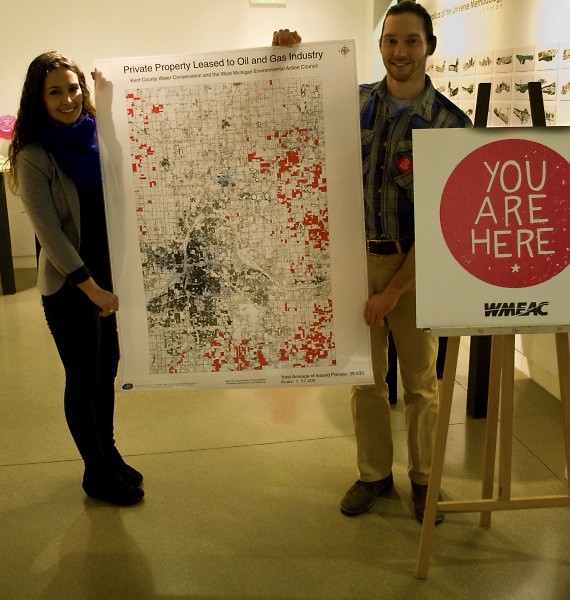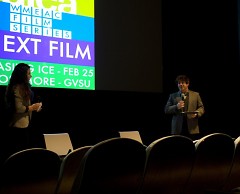Members from throughout the West Michigan community gathered at the Urban Institute for Contemporary Art (UICA) for the West Michigan Environmental Action Council's (WMEAC) 2013-2014 film series on Tuesday, January 21. They gathered to watch Gasland II, a followup to Josh Fox's Oscar-nominated film Gasland. The films are both part of a documentary series focusing on the effects of hydraulic fracturing, commonly known as fracking on the environment and communities where the wells are drilled.
Gasland II takes a personal look at the effects of fracking and focuses on several communities throughout the United States. Fox speaks with families currently undergoing medical treatment for chemicals lodged in their lungs, similar to those used in fracking fluid. He films the families as they lobby for the construction of new water pipelines, since their tap water has become laced with methane and unsuitable to drink. He tracks the progress of these communities as they push for anti-fracking legislation. Fox also traces his steps as he attempts to uncover why local, state and national government entities have been slow to respond in contamination cases across the nation.
Directly after the film, Nick Occhipinti, WMEAC’s Director of Policy and Community Activism, and Stephanie Mabie, co-founder of Kent Country Water Conservation, engaged the audience in a question and answer session focused on the effects of fracking in West Michigan.
Currently there are 20 active high volume horizontal fracturing wells across the state with about 50 being permitted. These wells differ from the traditional vertically drilled wells that have been prevalent across Michigan for 60 years.
“[High volume wells] are mostly in Kalkaska County, but we had one drilled in Ionia County last fall and it was fracked last spring,” says Mabie.
About 10% of land in Kent County is already leased for hydraulic fracturing well development, particularly land around the White Pine Trail, Rouge River State Game Area and Cannonsburg State Game Area.
“I think public land is public land. I think there are lots of different ideas about what public land means, but I think it is to be enjoyed and the ecosystem should be protected,” says Cheri Mcclain-Beatty, who attended the event.
Permits of up to 30 million gallons of water for a single high volume horizontal gas extraction site have been approved. This is compared to the 50,000 to 100,000 gallons used for traditional wells. This is possible due to exemptions in the Great Lakes Compact and Water Withdrawal Statute within the state. Successful wells may be fracked multiple times and the contaminated water is unable to reenter the water supply due to contamination.
“It’s already been an issue in Kalkaska, actually. At the Westerman Well they dropped the water table so low that the families living around that well were just pulling up air,” says Mabie.
The speakers both stressed the importance of local action to encourage lawmakers to take a hard look at the negative effects of fracking.
“On the state level, the Snyder administration and chairs of the energy committees in the house and senate are very pro natural gas right now,” says Occhipinti.
Both speakers encouraged citizens in Kent County to approach their local government.
“One model we’ve been following is the success of New York. They approached their local government and they passed moratoriums and local ordinances of bans depending on what the cities can do. We want to work with citizens from all 35 municipalities within Kent Country to pass protections and have that spread throughout Michigan, because ultimately that is what worked in New York,” says Mabie.
Disclosure: The author is currently an intern for WMEAC, in collaboration with The Rapidian's internship program.
The Rapidian, a program of the 501(c)3 nonprofit Community Media Center, relies on the community’s support to help cover the cost of training reporters and publishing content.
We need your help.
If each of our readers and content creators who values this community platform help support its creation and maintenance, The Rapidian can continue to educate and facilitate a conversation around issues for years to come.
Please support The Rapidian and make a contribution today.

